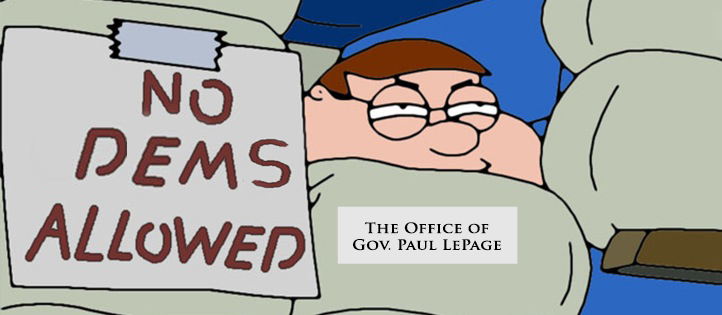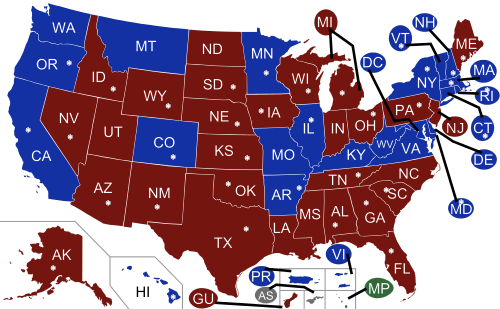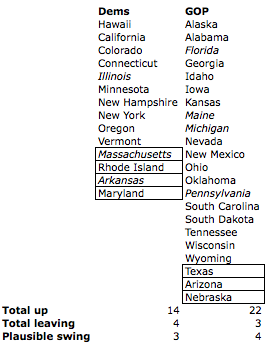Maine’s Republican Governor Paul LePage is continuing his crusade to dismantle the state’s reputation for moderate, reasonable, centrist politicians.
People often don’t believe it when someone says Maine’s Gov. Paul LePage is a political loon, but he’s almost indescribably far outside the mainstream, especially when one considers that that he occupies a governorship. Even deeply off-color jokes, vindictive mural attacks, and a strange belief that wind turbines are actually turned by motors because wind power couldn’t possibly work … all of those things are just the tip of the iceberg.
In a “revelation” (via in-depth investigative reporting) that surprises essentially no one who has been following his tenure as governor, except perhaps in its depth, Maine journalist and author Mike Tipping uncovered that in 2013 the governor met 8 times (almost monthly for a while) for 16 hours total with members of a super ultra fringe movement associated with small acts of domestic terrorism, various cop-killings, and the Oklahoma City Bombing.
Gov. LePage’s buddies this time are the very dangerous “sovereign citizen” wingnuts (the same people who don’t believe the government — state let alone Federal! — can issue license plates or passports or enforce traffic laws … or exist). They’re the king of unhinged American conspiracy theories but are also on various FBI watchlists for specific plots.
Here is an excerpt from the condensed summary Maine journalist Colin Woodard — whose incredible book, incidentally, I’ll be posting a review of soon — contributed to Politico on the stunning findings by Tipping:
he had met with an obscure circle of particularly nutty conspiracy theorists at least eight times for a total of 16 hours last year, despite the objections of his staff.
Some of the members of the circle have previously identified themselves as “Sovereign Citizens,” [skip to 17:00], a movement the FBI considers a domestic terrorist threat, though at least some of them now deny any such association. Members have espoused the belief that the Sept. 11, 2001, attacks and the Sandy Hook school shootings were perpetrated by the U.S. government, which engages in “mind control” and is preparing a “holocaust” against America’s Christians. They think the government is illegitimate and that top state officials are guilty of treason.
And last February, one recounted on his pirate radio broadcast [19:00] a meeting he had just attended with Governor LePage in which he said the execution of the top leaders of the Democrat-controlled state legislature was discussed. “They’re talking about hanging them,’” Jack McCarthy, host of the Aroostook Watchman radio show, recalled LePage saying in the meeting with McCarthy and his colleagues. McCarthy shared his response to LePage with his listeners: “Praise the Lord, let’s hang a few. We’ll be done with this crap.”
Although he admits these meetings took place, LePage has denied the conversations turned to eliminating his political opponents. “It never happened,” he said in a spontaneous call to the managing editor of the Bangor Daily News, whose paper he also threatened to sue. “We did not discuss execution, arrest or hanging.”
Hanging the Democratic leadership or no, the governor’s sustained interest in the conspiracy theorists’ ideas has stunned Maine’s political class, especially as LePage had famously refused for months to meet with the very legislative leaders the extremists accused of treason.
[…]
The conspiracy theorists, variously organized as the Maine Constitutional Coalition and We The People of Maine, warned the governor and the small number of other people who would listen that all lawyers are “foreign citizens” and associated with the Communist Party, that Maine’s government was unlawful on account of using paper currency and associating with the United Nations to deprive Mainers of their property rights, and that legislators and other officials were guilty of treason, a crime punishable by death.
[…]
Eventually, LePage’s legal counsel—apparently concerned about the governor’s credulity regarding the extremists’ constitutional theories—took the time to prepare a five-page legal memo for him […] reminding him that “the power of the executive [doesn’t] extend to providing a mechanism for private citizens to declare laws to be unconstitutional.”
If you follow through to Tipping’s report, the governor also claimed to them that he feared for his life if he did not accept Federal funding for something. He only stopped the meetings, apparently, after Tipping’s Freedom of Information Act request began ringing enough alarm bells.
Governor LePage faces re-election this November. Our analysis from May remains essentially unchanged up to this scandal:
Maine: Paul LePage (R) is also a terrible and very unpopular governor, who is also (ideologically) a crazy person. He was only elected in a 3-way race in 2010, where the sane people made the mistake of splitting their votes between the other two candidates. Maine isn’t planning to repeat that mistake this year. Haha, just kidding: It’ll be a 3-way race again and probably a nail-biter to the end, between LePage and Congressman Mike Michaud (D). LePage is doing better (somehow) in polls more recently than he was for most of last year.
We’ll see how things develop from here.









